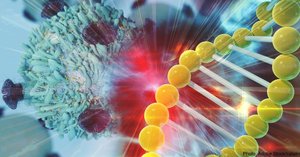Scientists have found that a variant of the genetic marker rs1429142 is responsible for causing an increased risk of breast cancer in Caucasian women compared to women who don’t have the variant.It’s the first study of its kind to compare breast cancer risk between premenopausal Caucasian women and postmenopausal Caucasian women. Most genetic studies focus on postmenopausal women alone. After all, most breast cancers are diagnosed in women who are over 55 years old. But inherited forms of breast cancer — which are often linked to genetic mutations — tend to be more aggressive and are typically diagnosed at a younger age.“Finding this genetic marker is like starting with a high-resolution Google map of the world, and then slowly zooming in to the image of your house,” researcher Sambasivarao Damaraju said. “It is valuable to do because now we have essentially planted a road sign on the chromosome that can help future researchers to carry out further in-depth studies.” Photo: Adobe Stock/catalin
Photo: Adobe Stock/catalin
The study was published in the International Journal of Cancer and led by Sambasivarao Damaraju, a professor at the University of Alberta’s Department of Laboratory Medicine & Pathology. He’s also a member of the Cancer Research Institute of Northern Alberta.Damaraju and his team studied over 9,000 women from Alberta for the study, some of whom had been diagnosed with breast cancer and some who served as healthy controls. Using the participants’ DNA gathered from blood samples, the team found that rs1429142 consistently cropped up in association with elevated breast cancer risk. Photo: Adobe Stock/andreaobzerova
Photo: Adobe Stock/andreaobzerova
When they separated the data by menopausal status, the difference in risk was significant. Premenopausal women had a 40% higher risk than postmenopausal women.The team took what they learned in this study and also looked at the gene’s impact on women of Chinese and African descent. They found that rs1429142 was associated with premenopausal breast cancer risk in women of African descent, but not women of Chinese descent.While researchers were focused primarily on the rs1429142 gene for this study, they did find that there were other genetic variants that were also associated with premenopausal breast cancer risk that require further research. Photo: Adobe Stock/phonlamaiphoto
Photo: Adobe Stock/phonlamaiphoto
The more genes scientists discover that affect breast cancer risk, the more tools doctors will have at their disposal to help people who are at increased risk for the disease.“This is important because the more we are able to create a complete picture of all the genes and all the variations and mutations that contribute to breast cancer, the closer we get to developing a genetic screen for breast cancer on a population level,” said Damaraju. “If we can identify women at risk before they are diagnosed, and as long as we have the resources to mitigate that risk through preventative approaches, we can reduce the overall burden of breast cancer risk in a population.”Source
Home World News Researchers Discover Genetic Marker That Increases Risk Of Premenopausal Breast Cancer






